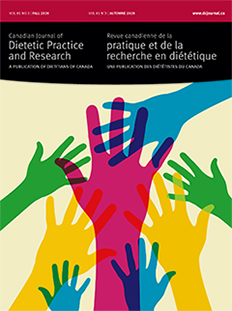Weight Inclusive Practice: Shifting the Focus from Weight to Social Justice
Abstract
Résumé
Get full access to this article
View all available purchase options and get full access to this article.
References
Supplementary Material
- Download
- 43.10 KB
Information & Authors
Information
Published In

History
Copyright
Authors
Metrics & Citations
Metrics
Other Metrics
Citations
Cite As
Export Citations
If you have the appropriate software installed, you can download article citation data to the citation manager of your choice. Simply select your manager software from the list below and click Download.
There are no citations for this item
View Options
Get Access
Login options
Check if you access through your login credentials or your institution to get full access on this article.
Subscribe
Click on the button below to subscribe to Canadian Journal of Dietetic Practice and Research


